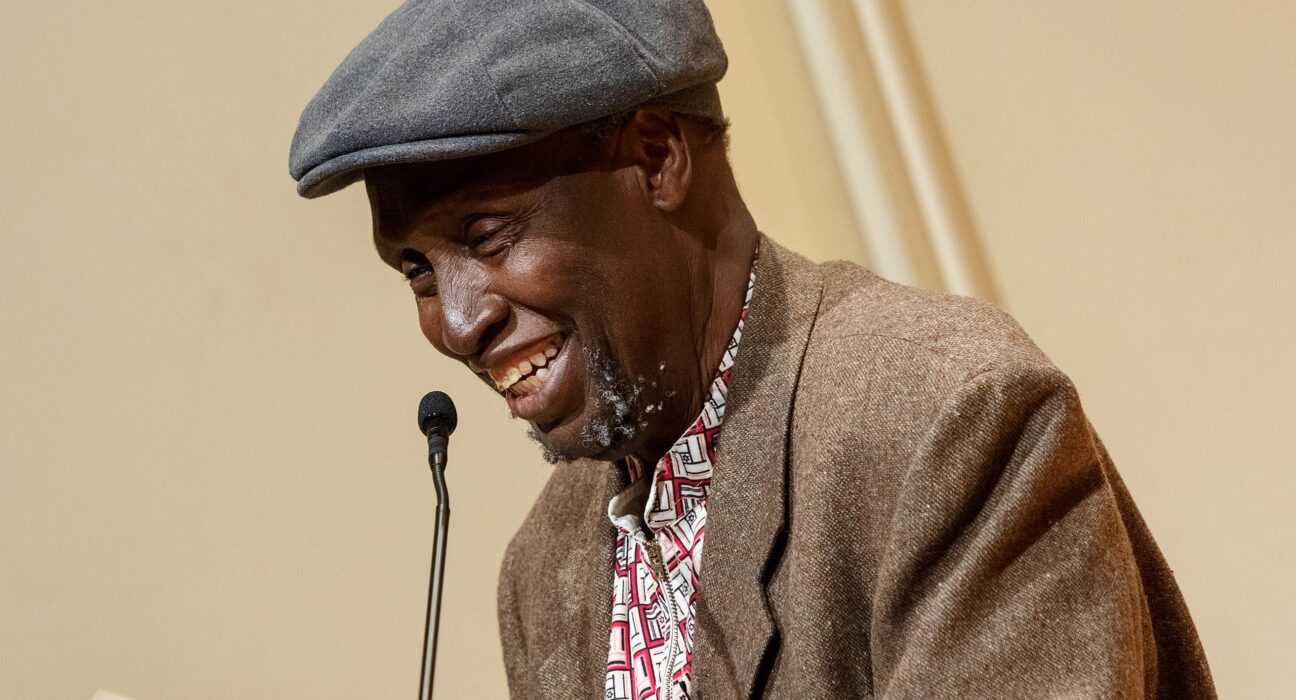Ngũgĩ wa Thiong’o stands as one of Africa’s most influential literary figures, a Kenyan novelist, playwright, and essayist whose works have shaped postcolonial literature and championed the decolonization of African narratives. Born James Ngugi on January 5, 1938, in Kamiriithu, Kenya, Ngũgĩ’s life and writings reflect the struggles of colonial and postcolonial Kenya, blending Gikuyu cultural heritage with universal themes of resistance, identity, and justice. His decision to write in his native Gikuyu language and his advocacy for African languages have cemented his legacy as a pioneer of cultural reclamation.
Early Life: A Foundation in Resistance
Ngũgĩ was born into a large Gikuyu peasant family during British colonial rule, a period marked by land dispossession and cultural suppression. His father, Thiong’o wa Nducu, was a tenant farmer displaced by the British Imperial Land Act of 1915, and his mother, Wanjiku, was one of four wives in a polygamous household. The Mau Mau Uprising (1952–1963), a Gikuyu-led rebellion against colonial oppression, deeply shaped Ngũgĩ’s worldview. His family faced direct consequences: one half-brother was killed fighting for the Kenya Land and Freedom Army, another was shot during the State of Emergency, and his mother endured torture for suspected rebel support.
Educated at mission schools, Alliance High School, and Makerere University in Uganda, Ngũgĩ initially wrote in English under the name James Ngugi. His time at the University of Leeds in the 1960s exposed him to Marxist and anticolonial theories, influencing his later works. In the 1970s, he rejected his Christian name and English as his primary literary language, embracing Gikuyu to decolonize African literature. His activism led to his 1977 detention without trial at Kamiti Maximum Security Prison, where he wrote Devil on the Cross (1980) on toilet paper. Exiled from Kenya in 1982, Ngũgĩ lived in the United States until 2004, teaching at institutions like Yale and the University of California, Irvine.
Ngũgĩ’s Literary Career: Themes and Impact
Ngũgĩ’s works span novels, plays, essays, short stories, and children’s books, addressing themes of colonialism, postcolonial betrayal, cultural identity, and linguistic decolonization. His shift to Gikuyu was a radical act, challenging the dominance of European languages in African literature. He founded Mũtĩiri, a Gikuyu-language journal, and his short story The Upright Revolution: Or Why Humans Walk Upright has been translated into over 100 languages, showcasing his global reach.
Ngũgĩ’s activism extended beyond writing. His play Ngaahika Ndeenda (I Will Marry When I Want), co-authored with Ngũgĩ wa Mirii, empowered rural communities but led to his detention. His essays, such as those in Decolonising the Mind (1986), argue for cultural liberation through African languages. Despite controversies, including 2024 allegations of domestic abuse by his son Mukoma wa Ngũgĩ, Ngũgĩ remains a towering figure, often cited as a Nobel Prize contender. His awards include the 2001 International Nonino Prize, the 2016 Park Kyong-ni Prize, and multiple honorary doctorates.
Essential Reading List: Ngũgĩ wa Thiong’o’s Must-Read Works
Ngũgĩ’s extensive bibliography offers a rich exploration of Kenyan history, culture, and resistance. Below is an essential reading list of his most impactful works, organized by genre, with summaries and their significance in Kenyan and African literature.
Novels
- Weep Not, Child (1964)
- Summary: Ngũgĩ’s debut novel, written as James Ngugi, follows Njoroge, a young Gikuyu boy whose dreams of education are disrupted by the Mau Mau Uprising. The story explores land dispossession, colonial education, and family struggles.
- Significance: As the first novel in English by an East African, it established Ngũgĩ as a literary pioneer. It captures the personal toll of colonial violence, making it a foundational text in Kenyan literature.
- Themes: Colonial oppression, education, hope, and betrayal.
- Why Read It: A concise yet powerful introduction to Ngũgĩ’s early style and the Mau Mau era.
- The River Between (1965)
- Summary: Set in pre-independence Kenya, this novel centers on Waiyaki, a young Gikuyu leader navigating tensions between Christian converts and traditionalists in two rival villages. It explores cultural division and the quest for unity.
- Significance: Written before Weep Not, Child but published later, it reflects Ngũgĩ’s focus on Gikuyu identity and the clash between tradition and modernity.
- Themes: Cultural conflict, leadership, education, and resistance.
- Why Read It: Offers insight into the cultural dilemmas of colonial Kenya, with lyrical prose.
- A Grain of Wheat (1967)
- Summary: Set during Kenya’s independence celebrations in 1963, this novel examines the disillusionment of Uhuru through interconnected stories of Gikuyu villagers. Characters grapple with betrayal, guilt, and the legacy of the Mau Mau struggle.
- Significance: Ngũgĩ’s most critically acclaimed early work, it critiques the failures of postcolonial elites and showcases his narrative complexity.
- Themes: Betrayal, independence, collective memory, and sacrifice.
- Why Read It: A sophisticated exploration of Kenya’s transition to independence, blending historical and personal narratives.
- Petals of Blood (1977)
- Summary: This novel follows four characters—Munira, Karega, Wanja, and Abdulla—in the fictional village of Ilmorog, exposing the corruption and inequality of postcolonial Kenya. It critiques capitalism and neocolonialism.
- Significance: Its Marxist lens and scathing critique of Kenya’s elite led to Ngũgĩ’s detention. It marks his shift toward radical activism.
- Themes: Neocolonialism, class struggle, betrayal, and community.
- Why Read It: A powerful indictment of postcolonial failures, rich in social commentary.
- Devil on the Cross (1980, Gikuyu: Caitaani Mũtharabainĩ)
- Summary: Written in Gikuyu during Ngũgĩ’s detention, this satirical novel follows Wariinga, a young woman confronting exploitation in postcolonial Kenya. It portrays a “Devil’s Feast” where capitalists boast of their corruption.
- Significance: Ngũgĩ’s first novel in Gikuyu, it embodies his commitment to African languages and critiques systemic greed.
- Themes: Capitalism, gender oppression, cultural resistance, and satire.
- Why Read It: A bold, accessible satire that showcases Ngũgĩ’s linguistic revolution.
- Wizard of the Crow (2006, Gikuyu: Mũrogi wa Kagogo)
- Summary: A sprawling satire set in the fictional African country of Aburĩria, this novel follows Kamiti and Nyawira as they resist a tyrannical regime. It blends magical realism with political critique.
- Significance: Ngũgĩ’s most ambitious work, it critiques global capitalism and authoritarianism while celebrating African storytelling traditions.
- Themes: Dictatorship, resistance, magical realism, and globalization.
- Why Read It: A modern masterpiece combining humor, folklore, and political insight.
Plays
- The Black Hermit (1963)
- Summary: Ngũgĩ’s first play, written as James Ngugi, follows Remi, a young man torn between urban education and his rural tribal roots. It explores the tension between modernity and tradition.
- Significance: Performed at Uganda’s independence celebrations, it marked Ngũgĩ’s early engagement with theater as a tool for social commentary.
- Themes: Alienation, cultural identity, and independence.
- Why Read It: A concise introduction to Ngũgĩ’s dramatic work and early themes.
- Ngaahika Ndeenda (I Will Marry When I Want, 1977, co-authored with Ngũgĩ wa Mirii)
- Summary: Written in Gikuyu, this play portrays the exploitation of peasants by postcolonial elites, focusing on a farmer’s struggle against land theft. It was performed by Kamiriithu villagers.
- Significance: Its community-based production empowered rural audiences but led to Ngũgĩ’s detention and the banning of the Kamiriithu Cultural Centre.
- Themes: Class struggle, land rights, and community empowerment.
- Why Read It: A landmark in African theater, showcasing Ngũgĩ’s commitment to accessible, revolutionary art.
Essays and Nonfiction
- Decolonising the Mind: The Politics of Language in African Literature (1986)
- Summary: This collection of essays argues that African writers must use indigenous languages to resist cultural imperialism. It reflects Ngũgĩ’s own shift to Gikuyu.
- Significance: A seminal text in postcolonial studies, it has influenced global discussions on language and identity.
- Themes: Linguistic decolonization, cultural identity, and intellectual resistance.
- Why Read It: Essential for understanding Ngũgĩ’s philosophy and the broader African literary movement.
- Detained: A Writer’s Prison Diary (1981)
- Summary: Ngũgĩ’s memoir of his 1977–1978 detention at Kamiti Prison details his experiences, reflections, and the creation of Devil on the Cross.
- Significance: It offers a personal account of political repression and Ngũgĩ’s resilience, written with raw honesty.
- Themes: Imprisonment, resistance, and creativity under oppression.
- Why Read It: A gripping firsthand narrative of Kenya’s postcolonial struggles.
Short Stories and Children’s Books
- The Upright Revolution: Or Why Humans Walk Upright (2016)
- Summary: This Gikuyu fable, translated into over 100 languages, explains why humans walk upright through a contest among body parts. It celebrates African oral traditions.
- Significance: Its global translations highlight Ngũgĩ’s influence and the universal appeal of African storytelling.
- Themes: Cooperation, community, and cultural pride.
- Why Read It: A short, accessible entry into Ngũgĩ’s work, ideal for all ages.
- Njamba Nene Series (1980s, Gikuyu)
- Summary: This series of children’s books, written in Gikuyu, follows Njamba Nene, a young hero navigating colonial and postcolonial challenges. Titles include Njamba Nene and the Flying Bus.
- Significance: Aimed at young readers, these stories instill cultural pride and resistance in Gikuyu children.
- Themes: Bravery, cultural identity, and anticolonialism.
- Why Read It: Perfect for introducing young readers to Ngũgĩ’s themes and Gikuyu language.
Ngũgĩ’s Personal Life and Its Influence on His Work
Ngũgĩ’s personal experiences—colonial oppression, detention, exile, and family dynamics—permeate his writing. His first marriage to Nyambura (1961–1978) produced six children, four of whom (Tee, Nducu, Mukoma, and Wanjiku) are published authors. His second marriage to Njeeri wa Ndung’o in 1992 added three children, including a stepdaughter. A 2004 attack in Nairobi, where Ngũgĩ was assaulted and Njeeri sexually assaulted, underscored the risks of his activism. In 2024, Mukoma wa Ngũgĩ alleged that Ngũgĩ abused Nyambura, sparking debate about his legacy. These personal struggles inform his themes of resistance, betrayal, and cultural reclamation.
Key Influences on Ngũgĩ’s Writing
- Mau Mau Uprising: Shaped his early novels, particularly Weep Not, Child and A Grain of Wheat, which depict the human cost of anticolonial struggles.
- Detention and Exile: Devil on the Cross and Detained reflect his experiences of repression and resilience.
- Gikuyu Heritage: His shift to Gikuyu, evident in Devil on the Cross and Njamba Nene, asserts cultural sovereignty.
- Postcolonial Critique: Petals of Blood and Wizard of the Crow expose the failures of postcolonial elites, drawing from Ngũgĩ’s disillusionment with Kenya’s leadership.
Ngũgĩ’s Global Impact and Legacy
Ngũgĩ’s influence extends beyond Kenya. His works are studied in universities worldwide, and his advocacy for African languages has inspired writers like Chinua Achebe and Wole Soyinka. His awards, including the 2019 Catalonia International Prize and the 2021 EBRD Literature Prize, affirm his global stature. Despite controversies, his commitment to cultural and linguistic decolonization remains a beacon for African writers.
Why Ngũgĩ Matters Today
- Cultural Reclamation: His use of Gikuyu challenges linguistic imperialism, encouraging writers to embrace indigenous languages.
- Social Justice: His critiques of capitalism and authoritarianism resonate in contemporary debates about inequality.
- Educational Impact: His works are staples in African and postcolonial literature curricula, shaping new generations of scholars and writers.
- Family Legacy: His children’s literary contributions extend his influence, creating a dynasty of African voices.
Reading Ngũgĩ: Tips for New Readers
For those new to Ngũgĩ’s works, start with his early novels (Weep Not, Child or The River Between) for their accessibility and historical context. Progress to Petals of Blood or Wizard of the Crow for deeper political insights, and explore Decolonising the Mind for his philosophical framework. His Gikuyu works, available in translation, offer a unique perspective on African storytelling. Libraries, bookstores, and online platforms like Amazon carry his books, with some available in Gikuyu through East African publishers.
A Literary Titan’s Enduring Voice
Ngũgĩ wa Thiong’o’s life and works embody the struggles and aspirations of postcolonial Africa. From his early novels capturing the Mau Mau era to his Gikuyu writings challenging cultural imperialism, Ngũgĩ has redefined African literature. His essential reading list—spanning novels, plays, essays, and children’s books—offers a comprehensive journey through Kenya’s history and identity. Despite personal controversies, his legacy as a writer, activist, and cultural icon endures, inspiring readers and writers worldwide. For Kenyan literature enthusiasts, Ngũgĩ’s works are not just books but a call to reclaim and celebrate African narratives.





